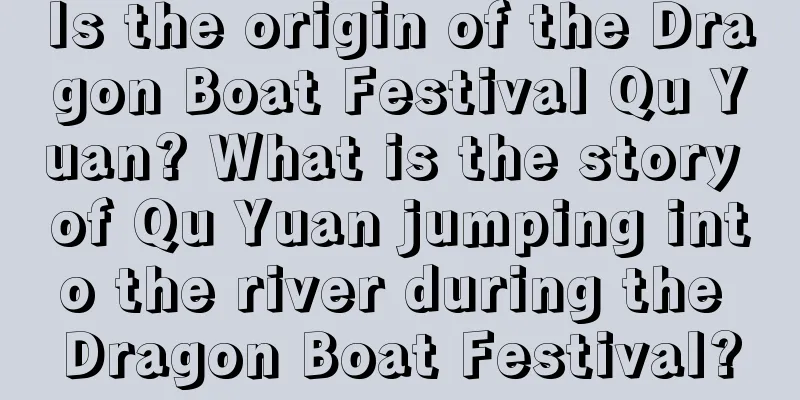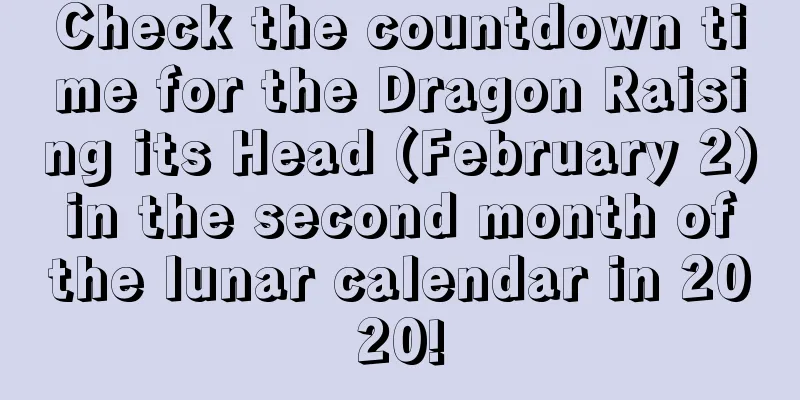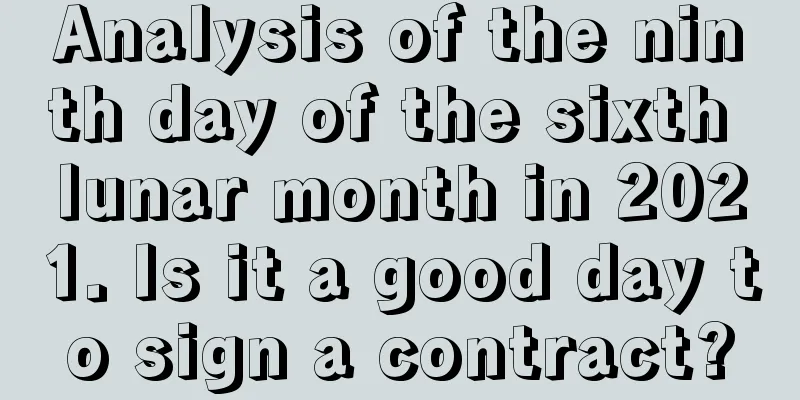Is the origin of the Dragon Boat Festival Qu Yuan? What is the story of Qu Yuan jumping into the river during the Dragon Boat Festival?

The Dragon Boat Festival originated from the worship of celestial phenomena and evolved from the dragon sacrifice in ancient times. The Dragon Boat Festival is a very rich festival. Do you want to know more about it? There are spring, summer, autumn and winter in a year, and the fifth month of the lunar calendar is the peak of summer. If you want to know more about the fifth month of the lunar calendar, please pay attention to Mr. Shui Mo’s special topic on the fifth month of the lunar calendar!Is the origin of the Dragon Boat Festival Qu Yuan?The origin of the Dragon Boat Festival is not the story of Qu Yuan, but the story of Qu Yuan has enriched the culture and connotation of the Dragon Boat Festival.The word "Dragon Boat Festival" first appeared in "Fengtu Ji" of the Western Jin Dynasty: "The Dragon Boat Festival in midsummer is on May 5th. People attach great importance to this day, which is the same as the summer solstice." "Duan" in ancient Chinese means beginning or start, so "Duanwu" means "the fifth day of the first lunar month." "Shuowen Jiezi" says: "Duan means the beginning of things", which means that Duan means the beginning, so the fifth day of May is called "Duanwu Festival". "Sui Shi Guang Ji" said: "The merchants in the capital city call the first day of May "Duan Yi", the second day "Duan Er", and the fifth day "Duan Wu." The ancients used to call the first few days of May "Duan". Therefore, the first noon day of May is called Dragon Boat Festival. However, the customs of the Dragon Boat Festival have existed for a long time, such as the customs of dragon boat racing and sacrificial offerings, which have long existed. According to relevant information, the Dragon Boat Festival originated from the worship of celestial phenomena and evolved from the dragon totem worship in ancient times. The formation of the Dragon Boat Festival dragon worship custom is related to primitive beliefs, sacrificial culture, the Ganzhi calendar, and the celestial phenomenon of the Azure Dragon being in the south. In ancient times, people determined the celestial phenomena and the rituals of the earth. According to the orbits and positions of the sun, moon and stars, they divided the areas near the ecliptic and the equator into 28 groups of constellations, commonly known as the "28 Mansions". The four directions of southeast, northwest, and northeast are each divided into seven mansions, namely the "Four Symbols"; in the east, "Jiao, Kang, Di, Fang, Xin, Wei, and Ji" form a complete dragon-shaped constellation, namely the Seven Mansions of the Blue Dragon. The appearance and disappearance cycles of the Blue Dragon's seven stars are consistent with the four seasons of the year. They rise in the east in spring, rise in the south in summer, set in the west in autumn, and disappear below the northern horizon in winter. During the Dragon Boat Festival in midsummer, the Blue Dragon hangs high in the south sky. The Book of Changes calls it "the flying dragon in the sky". The dragon star is in the "center" position, which is both "center" and "correct", a sign of great luck. "Dragon" is the primitive belief of our ancient ancestors. Every year on the Dragon Boat Festival in midsummer when "the dragon is flying in the sky", our ancestors held a grand totem sacrifice in the form of dragon boat racing to thank the dragon ancestor for his kindness, pray for blessings, and suppress evil and ward off disasters. What is the story of Qu Yuan jumping into the river during the Dragon Boat Festival?Qu Yuan (c. 339 BC - c. 278 BC) was a native of Danyang (now Zigui, Yichang, Hubei) in the State of Chu during the late Warring States Period and a minister of King Huai of Chu during the Spring and Autumn Period. He is a model of a patriotic martyr. Even though he was harmed by evil people, he still cared about his country in exile.According to legend, Qu Yuan advocated the selection of virtuous people and the empowerment of them, the enrichment of the country and the strengthening of the military, and strongly advocated the alliance between Qi and Qin. He was strongly opposed by aristocrats such as Zi Lan. Qu Yuan was slandered and resigned, and was expelled from the capital and exiled to the Yuan and Xiang River basins. During his exile, he wrote poems such as "Li Sao", "Heavenly Questions" and "Nine Songs" which expressed his concern for the country and the people. In 278 BC, the Qin army conquered the capital of the Chu State. Qu Yuan was heartbroken to see his country being invaded, but he could not bear to abandon his country. On the fifth day of the fifth lunar month, after writing his last work "Huaisha", he hugged a stone and jumped into the Miluo River to commit suicide, thus composing a magnificent patriotic piece with his life. Qu Yuan had always been loved by the local people, so after Qu Yuan jumped into the river, the local people heard the news and rushed to the scene and immediately rowed boats to rescue him, but they were unable to find Qu Yuan's body. To express their grief, people rowed boats on rivers and wrapped rice balls in rice leaves and threw them into the river to avoid destroying Qu Yuan's body. Because of this, the custom of dragon boat racing and eating rice dumplings gradually formed on the Dragon Boat Festival. Of course, Qu Yuan's story is just a legend formed by combining history. In fact, dragon boat racing originated from the dragon boats used for dragon sacrifices in ancient times, and the origin of zongzi is a tribute to ancestral gods. However, Qu Yuan's spirit was integrated with the Dragon Boat Festival to form the current Dragon Boat Festival. Do you want to know your own Bazi? Want to figure out where your golden marriage is? Click on the [Premium Calculation] below to calculate your horoscope and fortune! |
Recommend
Is it good for people born in the Year of the Ox to be born during the Beginning of Summer? How is fate?
The fortune of the Ox born in different solar term...
Is the first day of the eighth lunar month in 2022 suitable for proposing? What is the lunar calendar like?
The eighth month of the lunar calendar is the seco...
Which zodiac sign is Mother’s Day on March 28, 2021? What is your view on love?
The third month of the lunar calendar is tradition...
Is it a good time to move on the eighth day of the twelfth lunar month in 2018?
The twelfth month of the lunar calendar is common...
Is it good to be born on February 13th of the lunar calendar in 2022? Girl's fate analysis
Whether a girl’s fate is good or not depends on th...
Is it a good time to start renovation on the 24th day of the sixth lunar month in 2019?
June is approaching autumn, and fruits are gradual...
Is March 26th of the lunar calendar in 2022 an auspicious day for praying? Is it good to pray?
The good and bad days in the lunar calendar are di...
Is it possible to get engaged on the third day of the twelfth lunar month in 2021? What is the hexagram for this day?
The twelfth month of the lunar calendar has arrive...
Is it possible to get engaged in June of the lunar calendar in 2022? What are the rules?
The sixth lunar month of 2022 is coming soon. Do y...
Lunar February 19, 2018
Winter has gone and spring has come. February in ...
Analysis of the 24th day of October in the lunar calendar in 2021. Is it a good day to move house?
Every day is different, some days are good, and so...
Is it a good idea to get married during the Great Cold of 2018? What should you pay attention to when choosing a wedding date?
Introduction: Marriage is a major event in life, a...
Is it good to give birth to a baby on Laba Festival in 2022? Is the fate of a child born on Laba Festival good or bad?
Laba Festival is coming soon, and the Spring Festi...
The position of the God of Happiness on the seventh day of the eighth lunar month in 2018
According to the Chinese lunar calendar, August i...
Is October 14, 2019, the day before the Lower Yuan Festival a good day? Is the Lower Yuan Festival the Ghost Festival?
Introduction: Every day has its good and bad luck,...









